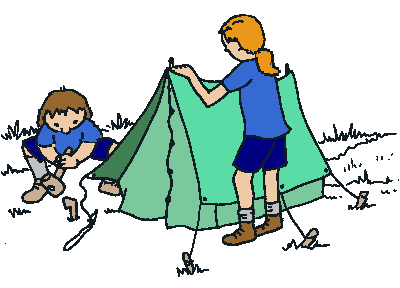Weight loss surgery has brought of lot of positive changes in your life. You’ve been more careful about the foods you eat. You’ve dropped several sizes since the surgery. And you feel more comfortable in your own skin.
Surgery has also brought a lot of lifestyle changes too. You’ve had to adjust how you approach family gatherings, so they focus on fun rather than food. You’ve learned to refuse certain meals and treats when dining out with friends. And you’ve quit smoking and given up drinking almost entirely.
But summer is in full swing now, and with it comes a lot of activities you don’t want to sacrifice, particularly camping. As you and your family prepare for your next vacation in the great outdoors, use the following guide to ensure your trip goes smoothly.
 Fun-Filled Activities
Fun-Filled Activities
Exercise and weight loss surgery go hand in hand. In fact, researchers found that bariatric surgery patients who participate in consistent exercise lost a standardized mean of 8 pounds more than those who exercised irregularly.
But you’ll want to take things slowly during the first few weeks after your surgery. Make sure your wounds have completely healed and that you have approval from your doctor before you attempt the following outdoor activities.
Walking
Ready to hit the trails? Walking remains one of the best post-op exercises. This low-impact exercise burns calories and improves your circulation.
During the first several weeks after surgery, you may feel weak and tire easily, so choose walking paths and trails that don’t put too much strain on your body.
If you’ve reached the later stages of your recovery, aim to walk two miles a day or more during your camping trip. But don’t forget to drink plenty of water!
Biking
Like walking, biking burns plenty of calories without straining the joints. Your doctor may even recommend that you ride a stationary bike at home during the first few weeks of recovery.
But as with walking, you should keep to well-worn trails and easy bike paths to avoid pushing yourself too hard while you camp. Start slow and work toward a pace that you lets you feel comfortable.
As you plan your trip, be cautious of weather patterns. You want to pick clothing that will keeps you dry without irritating your skin. Apply gels to sensitive areas to reduce friction.
Swimming
Once your wounds have healed, feel free to swim or bathe in the lake or ocean as much as you want. Swimming works the entire body, contributing to your endurance, strength, and flexibility.
Whether you choose to splash in the shallows or soak in deeper waters, remember to put your safety first. Even if you were an excellent swimmer before surgery, wear a life jacket and have other flotation devices on hand.
Easy-to-Prepare Foods
Now that you have your activities planned, you should pack your meals for the trip. You’ll have to pass on the campfire-roasted marshmallows and trail mix. But with the following meals and snacks, you’ll have the fuel and energy you need to fully enjoy your trip without ruining your weight loss goals.
Breakfasts
These outdoor breakfasts should pose no problem for you, as they don’t require a lot of preparation, nor do they need refrigeration to stay fresh.
- Oatmeal
- Grits
- Cream of Wheat
- Toasted bread
Keep in mind that you’ll want to make these meals yourself, rather than opting for their sugary pre-packaged equivalents.
Lunches and Dinners
Lunches and dinners require a bit more work than breakfasts, as some foods need extra cooking and storage. But the following meals have a good shelf life, and they offer plenty of nutrients, so you have the energy to walk, bike, and swim during your trip.
- Canned meats (fish, tuna, poultry, pork)
- Beans
- Fat-free chili
- Baked potatoes
- Lettuce wraps
Still in your early stages of recovery? You may struggle to digest these foods. If you need an easier option, choose whey or soy isolate protein shakes to meet your protein needs.
Snacks and Sweets
Weight loss surgery limits your typical camping snacks and sweets, as well as the number of snacks you can eat throughout the day. Ideally you’ll want to have three good meals per day—and only snack between meals if your meals are longer than five hours apart.
- Beef Jerky
- Canned and fresh soft fruits
- Walnuts, almonds, and other nuts
- Sugar free Jell-O (non-refrigerated)
As with your other meals, you’ll want to observe your portion sizes and carefully track your total calorie intake.
Don’t Forget to Talk with Your Doctor
These are just a few ideas to help you prepare for your upcoming trip. But before you ever pack your bags or rent your RV, just remember to talk with your doctor. He or she may have additional food and activity recommendations based on your current healing stage and health history.


